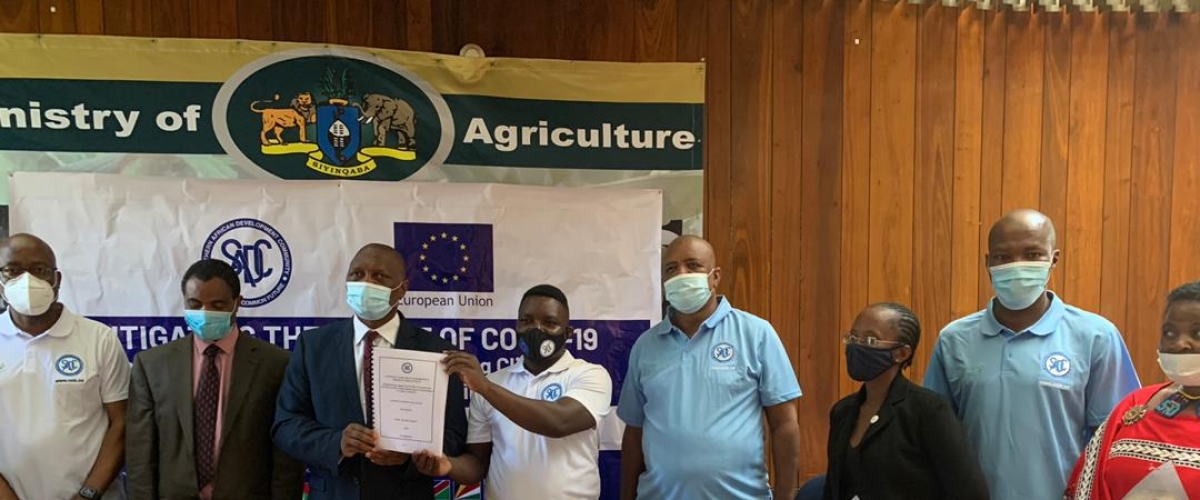
An 18-month project on mitigating the impact of COVID-19 on food and nutrition security using Climate-Smart Technologies (CSA) funded to the tune of US$180,000 by the European Union (EU) was launched at a colourful event in Eswatini on 23rd November 2020, while Mozambique does preparatory work.
The project in Eswatini will be implemented in Dvokolwako, at Philani Mswati Charity Trust home for the elderly. A mushroom expert from the Ministry of Agriculture is going to train about 47 women on how to grow and produce mushrooms for commercial purposes.
Some of the funds will go towards improving the greenhouses at the home which will be used to grow vegetables and fruit tree seedlings. A packing house will also be set up to store produce ready for market.
Similar projects are in the process of being launched in Mozambique, Zambia and Zimbabwe. This is part of efforts by the Southern African Development Community (SADC) and Centre for Coordination of Agricultural Research and Development for Southern Africa (CCARDESA), through the Global Climate Change Alliance Plus (GCCA+), to mitigate the effects of climate change on farming households using CSA technologies.
Climate change and variability have resulted in droughts and floods in Southern Africa, which have affected millions of people. The SADC region recorded a total of 44.8 million food-insecure people during the 2019/2020 agriculture season, an increase of 3.6 million people compared to the previous season, as a result of successive droughts.
After the Eswatini launch, the delegation visited Philani Mswati Charity Trust where it officiated the launch of the structure for mushroom production. The delegation visited different facilities at the trust, including greenhouse facilities and provided on-spot technical advice on some of the shortfalls. Furthermore, the delegation facilitated training needs assessment among the members of the trust who are mostly elderly women.
On the second day, the delegation visited mushroom production facilities at Malkerns Research Station where mushroom production processes were demonstrated. The representative of the Deputy Programme Manager at the research station explained the production of oyster mushroom and management of different production processes.
Philani Maswati Charity trust earmarks investing in vegetable production, mushroom production and dairy production which will primarily benefit the elderly women who are at high risk of COVID-19. The Ministry of Agriculture committed to supporting the implementation of the projects and the trust whose matron is the Queen Mother of Eswatini.
The trust partnered with the Department of Agricultural Research Services which will be providing spawns for mushroom production and training. The Acting Minister of Agriculture, Mr David Ngcamphalala, presided over the launch ceremony. He was accompanied by the Permanent Secretary in the Ministry, Mr Bongani Masuku, and other Senior Government officials in the ministry,
Representatives from Her Majesty, the Queen Mother of Eswatini and the chairperson and members of Philani Maswati Charity trust witnessed the launch. CCARDESA Programme Officer, Mr Barthlomew Chataika, who is also the desk officer for the project, led the delegation and represented CCARDESA and the SADC Secretariat, while Bembani Group was represented by its Chief Executive Officer, Mr Titus Baloyi and the Environmental Management Specialist Dr Qandelihle Simelane. In addition, other project members from SADC and CCARDESA followed the launch virtually.
From Eswatini, the delegation went to Mozambique and visited the proposed project site on 28th November 2020 where they made a feasibility assessment. The field size was estimated to be between five and six hectares of fertile black alluvial soils. There is adequate water from the nearby river and according to the extension officer, the weather is conducive for vegetable production. There is also electricity grid lines nearby from which the community can tap energy for supplying water into the field.
The delegation noted the development of a fish farming project nearby, which could provide an opportunity to integrate horticulture with fish production (aquaponics). Three investment options were suggested -- aquaponics, drip irrigation or use of tunnels, and fencing of the whole area to protect the vegetables from animal damage.
The turn-up of farmers for the meeting was not impressive as only three women and two men attended. One of the participants requested if there was a provision for a salary which was corroborated by the others. This posed a risk of sustaining the project activities if farmer mobilisation is not done adequately hence presenting a challenge on sustainability. The delegation saw an opportunity to benchmark the farmers' perception and status at project initiation as compared to the end-line survey.
Adequate farmer mobilisation and sensitisation were recommended to ensure a clear understanding of the project's objectives in relation to the much-needed income. Finally, the delegation observed market opportunities after visiting one of the outlet markets earmarked by the project.
The project is expected to facilitate the establishment of climate-smart irrigation facilities, facilitate access to fast-growing, high-value and nutritious vegetables; and associated inputs and facilitate post-harvest handling and market access among the beneficiary communities.





